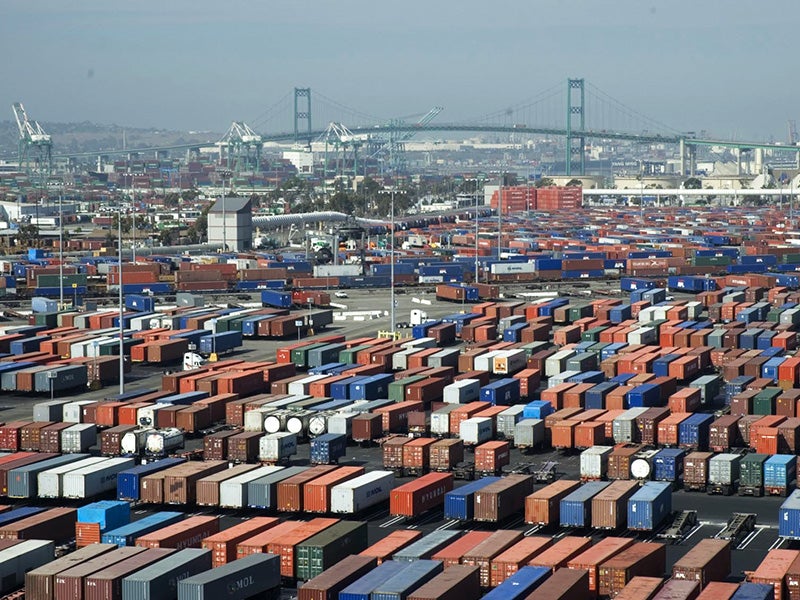Did Long Beach’s “Green Port” Violate State Environmental Laws?
City council vote August 19 will determine if port neglected to do necessary environmental assessments for climate change-causing coal and petcoke exports
Contact
When the Port of Long Beach decided earlier this summer to extend and expand exports of coal and petroleum coke (“petcoke”), community members questioned the decision. After all, it goes against federal, state and local environmental policies—including the Port’s own. And when asked if the “Green Port” would complete analysis of the negative impacts, as required by the California Environmental Quality Act (CEQA), the Port refused.
Now, on August 19 at 5 p.m., the Long Beach City Council will hear an appeal by the Natural Resources Defense Council (NRDC), Sierra Club, Earthjustice and Communities for a Better Environment and review the Port’s decision to determine whether the Port must go back and do an environmental analysis.
“It’s unacceptable for an arm of our government—and the Port is an entity of the City of Long Beach—to be in the business of pushing climate-change causing fuels on to other countries,” says Morgan Wyenn, attorney with the Natural Resources Defense Council. “This is especially true given that every level of our government, from the White House to the State of California and even the City of Long Beach, are advancing increasingly stronger policies to phase off of coal and otherwise reduce carbon pollution.”
CEQA requires agencies throughout the state to analyze the environmental impacts of potentially harmful decisions, but the Port claims it is exempt from this important requirement. Community members disagree, alleging that the coal and petcoke exported overseas would be burned for energy and contribute to global climate change; that the train cars carrying the coal into the Port are not covered, allowing coal to blow off the cars and into the nearby communities; and that promoting coal goes against federal, state and the Port’s own environmental policies.
“There are health effects from the point of origin to the end point with this material,” says Alicia River, Wilmington organizer for Communities for a Better Environment. “This petcoke is coming from local refineries in Wilmington—leaving a broad range of impacts in our community; it is not necessarily used here, but we are suffering the impacts of its production, and of preparing the material to be exported.”
In June, the Port of Long Beach entered into two new contracts to continue—and expand—export of coal and petcoke. One of the contracts sets a minimum amount of coal to be exported at 1.7 million tons every year.
“The lack of environmental review shows that the port has no interest in considering how their decisions impact surrounding communities,” said Jessica Yarnall Loarie, Staff Attorney with the Sierra Club. “By increasing the amount of coal exported out of Long Beach, residents could be exposed to unknown quantities of coal dust left behind by the movement of uncovered rail cars and diesel trucks heading to and from the port. Southern California already has the worst air in the nation, and moving more coal shipments through these neighborhoods for export will only make it worse.”
In 2012, California passed Joint Resolution No. 35 urging the U.S. to restrict exports of coal to any country that fails to regulate the emissions of greenhouse that are at least as restrictive as regulations in the U.S.The Joint Resolution states that the “environmental consequences of massive coal exports to Asia are severe” and that “[c]oal burning has contributed to significant human health risks.”
“We oppose this coal export terminal because we think the people of Long Beach deserve better,” said Earthjustice attorney Adrian Martinez. “This is a senseless project to lock these communities into 15 years of dirty coal pollution. The coal goes overseas but its health impacts stick around for a long time if this project goes through. The availability and abundance of clean energy tells us these communities can and must have better.”
The Port of Oakland recently rejected proposals to export coal because of the environmental impacts, and proposals to export coal in the Pacific Northwest have been largely blocked because of widespread opposition by the local community and environmentalists, making Long Beach’s “Green Port” in the minority of West Coast ports to continue coal exports.

Additional Resources
About Earthjustice
Earthjustice is the premier nonprofit environmental law organization. We wield the power of law and the strength of partnership to protect people's health, to preserve magnificent places and wildlife, to advance clean energy, and to combat climate change. We are here because the earth needs a good lawyer.